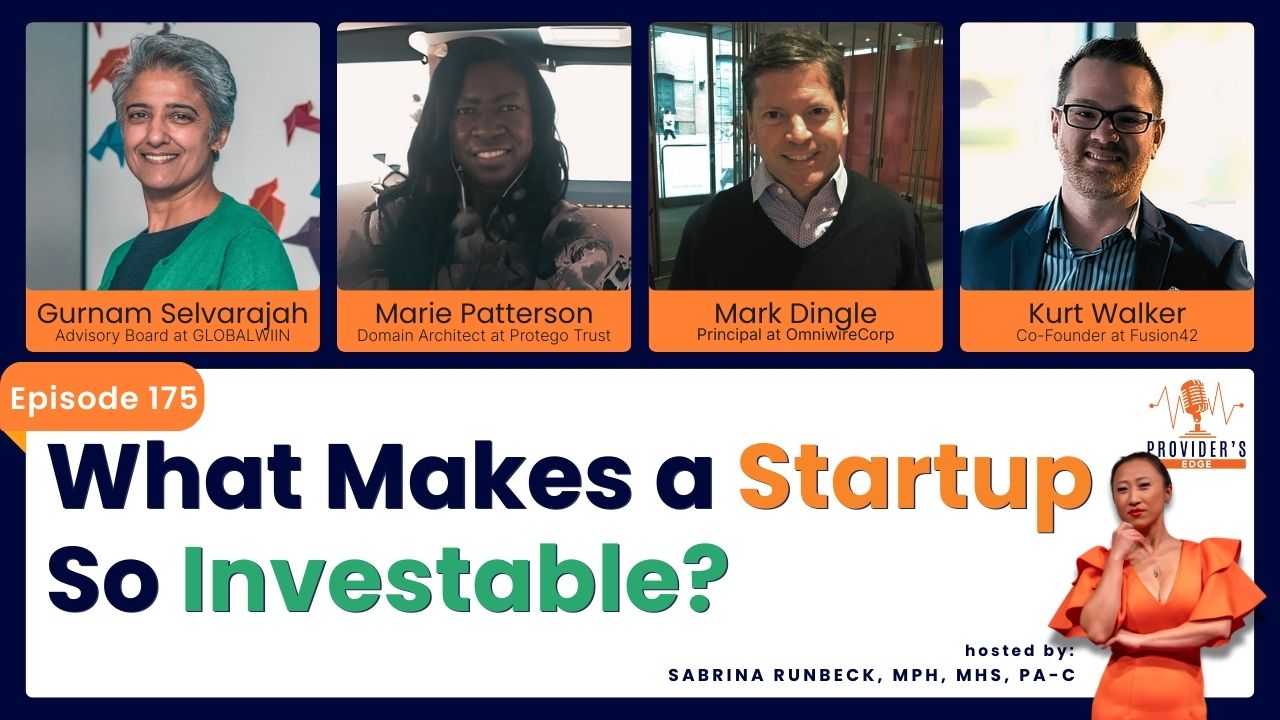
Protecting Wealth While
Scaling a HealthTech Startup
What Financial Systems Protect HealthTech Founders From Scaling Chaos and Personal Risk?
When your HealthTech company begins to scale, your biggest risk often isn’t your productit’s your personal exposure.
Many post-Series A and B founders discover that rapid growth, new capital, and expanding teams quietly multiply their financial vulnerabilities. A cyber breach, compliance issue, or lawsuit can instantly turn investor momentum into personal liability.
The irony? Founders who have achieved the most traction are often the least protected.
This full-length article unpacks how visionary healthcare foundersespecially clinician-turned-CEOscan scale safely and sustainably without losing control of their wealth or peace of mind.
Listen anywhere you get your podcastin' on.
Live Interview

The Myth of Momentum: Why Growth Without Structure Equals Risk
The early-stage hustle is intoxicating: proof of concept validated, early adopters onboard, maybe even investor interest heating up. But as Sabrina Runbeck and guest expert Dr. David Mandell emphasize, many founders unintentionally build their success on shaky foundations.
Most founders don’t ignore wealth planning they just delay it. After all, when you’re closing enterprise deals or prepping investor updates, sitting down to review trusts, insurance, or tax entities feels like a “someday” task.
But those decisions you postpone can become the fault lines of future crises. Every funding round adds legal, tax, and compliance complexity. Without proactive protection, personal wealth can become collateral damage.
“Aim for the best, plan for the worst. I’m an entrepreneur toobut I take risks wisely, knowing my assets are protected before I move forward.” – Dr. David Mandell
Smart founders understand that asset protection isn’t fear-drivenit’s freedom-driven. It allows you to move decisively, to seize opportunities knowing your personal foundation is stable.
The Systemic Solution: Building Revenue and Resilience
As PulsePoint Path often teaches, scaling isn’t just about adding moreit’s about strengthening the systems that support more. HealthTech founders often move from proof of concept to scaling so quickly that infrastructure lags behind ambition. That’s when cracks start to appear:
- Complex equity structures with no clear tax strategy.
- Overlapping personal and company assets.
- Founders paying themselves inefficiently through draws or salary.
- Insufficient D&O or cyber insurance coverage for enterprise-level risk.
At that stage, what once felt like “momentum” starts to feel like chaos.
Dr. Mandell has seen it repeatedly in his 30-year career helping physicians and entrepreneurs: “Your financial life isn’t just investingit’s modeling, saving, and preparing for every scenario. No single expert can do it all.”
His solution is what he calls a multi-specialty wealth modela team that mirrors the interconnectedness of your company’s operations. Attorneys, CPAs, CFPs, and insurance strategists working together to minimize blind spots. Just as medicine thrives on cross-functional collaboration, so does financial stewardship.
This multi-specialty model aligns with PulsePoint Path’s holistic philosophygrowth that integrates strategy, structure, and sustainability.
Confidence Comes From Delegation, Not Control
Many founders, especially clinicians-turned-CEOs, equate control with security. They believe that if they personally approve every invoice and forecast, their company is “safe.” But that mindset eventually limits scale.
As Sabrina Runbeck often reminds her founder clients:
“You can’t build confidence before actionit’s through action that confidence grows. Take the first step, then adjust your strategy with what you learn.”
The founder who refuses to delegate financial oversight is also refusing to grow. Delegation doesn’t mean detachment, it means clarity.
Consider these small, immediate moves:
- Hand your CPA a complete 12-month forecast to stress-test cash flow.
- Set up a simple liability separation between your company and personal assets.
- Hire a specialized advisor who understands both startup equity and healthcare regulation.
Confidence doesn’t come from holding tighterit comes from knowing the right systems and people are in place. Delegation, when done wisely, is an act of protection.
The Three Layers of Financial Protection Every Founder Needs
Dr. Mandell’s approach simplifies complex financial architecture into three critical protection layers that every scaling founder must build.
1. Legal & Structural Protection
- Establish the correct corporate entity (C-Corp, LLC, or holding structure) based on your funding roadmap and liability profile.
- Separate ownership of intellectual property and core operations.
- Create trusts or family limited partnerships for personal asset protection.
- Avoid commingling business and personal accountsit’s the fastest way to “pierce the corporate veil.”
2. Insurance & Risk Mitigation
- Review D&O, E&O, and Cyber Liability insurance annually, adjusting for each new contract or investor agreement.
- Include disability and life insurance, particularly for clinician-founders whose physical ability impacts income potential.
- Understand that investors often evaluate your insurance coverage as a proxy for leadership maturity.
3. Tax & Financial Modeling
- Develop a forward-looking financial model that integrates burn rate, tax exposure, and cash runway.
- Leverage incentives early: R&D credits, Qualified Small Business Stock (QSBS), and state-level innovation credits.
- Coordinate with advisors to align personal and corporate strategieswhat protects your business should protect you, too.
These layers are not “nice-to-haves”they’re leadership tools that signal to investors that you’re scaling intelligently.
Beyond Wealth Management: The Emotional Side of Financial Leadership
Financial protection isn’t just a numbers gameit’s an emotional one. Healthcare founders don’t fear risk; they fear uncertainty. And most of that uncertainty comes from financial blind spotsthe unknowns between what you earn, what you owe, and what’s actually secure.
“When founders stay stuck in financial fear, their vision for impact stalls. The right mindset and the right people turn that fear into fuel.” – Sabrina Runbeck
Financial intelligence is emotional regulation in disguise. When founders know their systems are strong, they operate with calm authority. Investors, teams, and patients feel that confidence.
At PulsePoint Path, this is the deeper transformation: shifting from reactive leadership to resilient stewardship.
Framework: From Reaction to Stewardship
Protecting wealth isn’t about building a fortressit’s about building flow. The goal is not to freeze assets but to channel them intelligently toward freedom, impact, and legacy.
Sabrina and Dr. Mandell outline this transition in four phases:
- Awareness – Recognizing that personal and business wealth are intertwined.
- Education – Learning the fundamentals of asset protection, tax efficiency, and delegation.
- Integration – Aligning financial systems with leadership structure and company mission.
- Optimization – Reviewing and refining protection strategies annually as the company scales.
This framework keeps founders focused on their zone of genius while ensuring the foundation beneath their growth remains unshakeable.
Why This Matters for Investors and Teams
The founders who treat financial protection as part of their leadership DNA build trust fasterwith investors, boards, and employees.
Investors want CEOs who understand risk and plan ahead. Teams perform better when leadership radiates clarity and confidence. And patients, partners, and clients benefit when the company is built to last.
Financial structure isn’t just a defensive moveit’s an act of visionary leadership.
When your company’s value rises, so does your exposure. The founders who endure aren’t just innovatorsthey’re stewards of the wealth, people, and impact they’re building.
Key Takeaways
- Early asset protection accelerates scalingit doesn’t slow it down.
- Delegating financial leadership is how you prevent chaos and burnout.
- Financial literacy is part of every CEO’s growth plan, not a luxury for later.
- Protecting wealth is a leadership actit sustains your mission and multiplies impact.
Relevant Resources
- Your Tech Isn’t Failing Your Compliance Strategy Is (Ep 148)
- Scaling Smart: How Founders Protect Their Burn Rate (Ep 162)
- The 5D System to Build Sustainable HealthTech Growth
About This Series
This article is part of PulsePoint Path’s Financial Leadership for Healthcare Founders series, dedicated to helping clinician-entrepreneurs build scalable, resilient companies.
Here are 3 ways we can support you right now:
🎤Be a Featured Guest on the Provider’s Edge
Have traction and a story to share? Apply to join us on the show: PulsePointPath.com/Call-Sabrina
🎯 Get You In Front of Investors
We match you with the most aligned investors and decision-makers who care about your niche already. Apply at CapitalEngine.vc
📊 Need clarity on finding your ideal co-founder or executive advisory board?
Let’s create your people-powered growth blueprint in under 6 hours 👉PulsePointPath.com/Leadership-Maximizer
About Sabrina Runbeck
Sabrina Runbeck, MPH, MHS, PA-C helps healthcare technology companies scale sustainably without burning out their teams or running out of cash. She is the Co-Founder of PulsePoint Path and works alongside an integrated 12-member board of advisors to help founders make strategic decisions that multiply impact and protect capital. Her signature 5D Integrated System helps companies move beyond one-dimensional problem solving what they think the issue is and instead, builds an Empowered Ecosystem across leadership, team dynamics, and system alignment. This is how founders evolve from early traction to 10x growth. Sabrina is also a TEDx speaker, former Cardiothoracic Surgery PA, and trusted advisor with over 15 years of experience in public health, neuroscience, and business acceleration.
★ NEXT STEP ★
Book an alignment call to see how we might support you: PulsePointPath.com/Call
Recommended Podcast Episodes
Be a guest on our show
The Provider's Edge show is always looking to feature healthcare change-makers and celebrate the work they are doing to improve healthcare.
Together, we can encourage other healthcare entrepreneurs and startup founders to up-level their businesses.
If you or someone you know could be a good fit as a guest on the show, please click on the bottom below to apply as a speaker.
Healthcare Entrepreneurs!
I can help you gain visibility and credibility in the right circles so you can accelerate your mission and profitability!
After overcoming burnout working in surgery, I went back to my roots in neuroscience and public health. I learned the importance of building key human relationships with my team throughout our organization.
While helping healthcare executives and entrepreneurs to get out of the day-to-day operation of their practice, I realized I needed more visibility and more connections to reach my ideal clients.
Once I set out to be highly visible in the right circles, I was able to leverage my network of strategic partners to convert clients 5x higher than any other marketing channel I had tried previously.
Now I help healthcare change-makers to accelerate their impact and increase profitability by gaining visibility and credibility with the right strategic partners.
My clients no longer worry about where their next client is coming from, the need to plan additional budget for ads spending, or losing the ability to connect with others because their social media account is shut down.
If you want to share your social mission with the world and gain pivotal supporters that become loyal clients... then you are in the right place, with the right consultant who is also a recovered clinician.




